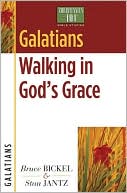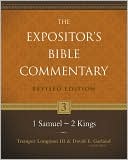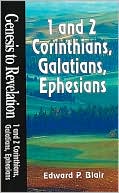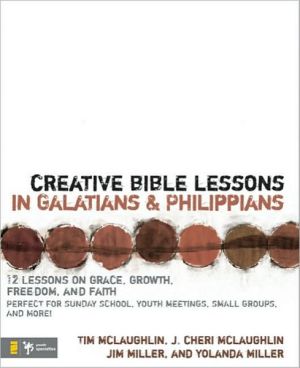Galatians: Free in Christ
Through Galatians: Free in Christ Bible study, participants will discover why conversion in Christ offers a new life of truly radical freedom.\ A Guided Discovery of the Bible The Bible invites us to explore God’s word and reflect on how we might respond to it. To do this, we need guidance and the right tools for discovery. The Six Weeks with the Bible series of Bible discussion guides offers both in a concise six-week format. Whether focusing on a specific biblical book or exploring a theme...
Search in google:
How to Use This Guide\ You might compare the Bible to a national park. The park is so large that you could spend months, even years, getting to know it. But a brief visit, if carefully planned, can be enjoyable and worthwhile. In a few hours you can drive through the park and pull over at a handful of sites. At each stop you can get out of the car, take a short trail through the woods, listen to the wind blowing through the trees, get a feel for the place.\ In this booklet, we will read Paul’s letter to the Galatians. Because the letter is fairly short, we will be able to read almost all of it in six sessions. The excerpts also are not very long, and so we will be able to walk through them at a leisurely pace, thinking carefully about what we are reading and what it means for our lives today.\ This guide provides everything you need to explore Galatians in six discussions—or to do a six-part exploration on your own. The introduction on page 6 will prepare you to get the most out of your reading. The weekly sections provide explanations that will help illuminate the meanings of the readings of Paul’s letter for your life. Equally important, each section supplies questions that will launch your group into fruitful discussion, helping you to both investigate Galatians for yourself and learn from one another. If you’re using the booklet by yourself, the questions will spur your personal reflection.\ Each discussion is meant to be a guided discovery.\ Guided. None of us is equipped to read the Bible without help. We read the Bible for ourselves but not by ourselves. Scripture was written to be understood and applied in the community of faith. So each week “A Guide to the Reading,” drawing on the work of both modern biblical scholars and Christian writers of the past, supplies background and explanations. The guide will help you grasp the meanings of Galatians. Think of it as a friendly park ranger who points out noteworthy details and explains what you’re looking at so you can appreciate things for yourself.\ Discovery. The purpose is for you to interact with Paul’s letter to the Galatians. “Questions for Careful Reading” is a tool to help you dig into the text and examine it carefully. “Questions for Application” will help you consider what these words mean for your life here and now. Each week concludes with an “Approach to Prayer” section that helps you respond to God’s word. Supplementary “Living Tradition” and “Saints in the Making” sections offer the thoughts and experiences of Christians past and present. By showing what Paul’s themes of Galatians have meant to others, these sections will help you consider what they mean for you.\ How long are the discussion sessions? We’ve assumed you will have about an hour and a half when you get together. If you have less time, you’ll find that most of the elements can be shortened somewhat.\ Is homework necessary? Yes. Some background information and a few key explanations are crucial for grasping the meaning of Paul’s letter to the Galatians. This guide will provide you with a helpful minimum of such assistance. You can expect to have fruitful discussions if you read the weekly explanatory material and prepare answers to the questions in advance of each meeting. The “Guides to the Reading” in Weeks 2–5 are longer than in other Six Weeks with the Bible books, in order to give you extra help to penetrate the meaning of this sometimes difficult letter.\ What about leadership? If you happen to have a world-class biblical scholar in your group, by all means ask him or her to lead the discussions. In the absence of any professional Scripture scholars, or even accomplished amateur biblical scholars, you can still have a first-class Bible discussion. Choose two or three people to take turns as facilitators, and have everyone read “Suggestions for Bible Discussion Groups” (page 92) before beginning.\ Does everyone need a guide? a Bible? Everyone in the group will need his or her own copy of this booklet. It contains all the text of Galatians discussed in the weekly sessions, so a Bible is not absolutely necessary—but each participant will find it useful to have one. And one or two of the questions do involve looking at other passages in the Bible that are not contained in this guide. You should have at least one Bible on hand for your discussions (see page 96 for recommendations.)\ How do we get started? Before you begin, take a look at the suggestions for Bible discussion groups (page 92) or individuals (page 95).\ Extreme Bible Reading\ Like athletic activities that span a range of intensity, the books of the New Testament make various demands on our concentration. At one end of the range, the little books such as 2 and 3 John are a walk in the park. Most of the books are more challenging. The letter of James is a vigorous tennis match, the Gospel of John is eighteen holes of golf on a championship course. At the far end of the range are the extreme sports: Hebrews (snowboarding?), Revelation (rock climbing?)—and Galatians. Galatians is a gut wrencher, the swimming-biking-running triathlon of the New Testament, all packed into six chapters.\ Without preliminaries, at verse 1 of Galatians we plunge immediately into a fast-flowing narrative. Farther on, as we emerge onto the dry land of theological discussion, the course leads steeply upward, through towering issues of literally cosmic importance. Passing through a theological battlefield, we feel the bruising impact of the most severe doctrinal crisis the Church has ever faced—the conflict that almost tore the young Church apart. As we speed through arguments based on Old Testament texts, we must stay alert to avoid treacherous quicksands of terminology and to keep from being overwhelmed by disputes that have raged in the Christian world ever since the Reformation. If we persevere and reach our goal, we will arrive at the point where St. Paul stands and will be able to look out with him as he views God’s decisive action in the world through his Son and his Holy Spirit—and we will see what God’s action means for us.\ Are you ready for this?\ As we gear up to read Galatians, we must prepare for a crucial challenge. In his letter to the Galatians, Paul focuses on a problem that we no longer face. Thank God, it was laid to rest long ago, partly through Paul’s efforts. Thus, reading Galatians means going back into the past and witnessing a dispute over a dead issue in order to find a living message for ourselves today.\ There are two dangers here. First, if we do not understand the problem that Paul was dealing with, we may misunderstand his words and read a different meaning into them. The result? We miss the message that Paul has for us. The second danger is that we may get lost in exploring the complex first-century situation that Paul faced and never make it back to the twenty-first century with the meaning of his message for ourselves.\ Let’s avoid both these dangers! To do so, we will look here at the problem Paul dealt with in Galatia and preview the value of his letter for us today. This will take a few pages, but stay with me. We’re getting in shape for the main event.\ To begin, let’s go back to the beginning of Christianity, to Jesus, and consider an item of crucial importance. Jesus was a Jew.\ God had chosen the Jews for a special relationship with himself. Through Moses, God made a covenant with the Jews (at the time, they were called Israelites, but Jews was the common name by the first century). He gave the Jews instructions for a holy way of life. This “Law of Moses” (considered to be the first five books of the Bible) contained the Ten Commandments, which expressed fundamental moral principles. “Thou shalt not kill,” for example, enshrined the inviolability of innocent human life (Exodus 20:13—King James Version). But the Law also contained much more, such as\ a cycle of festivals that acknowledged that land and fertility are gifts from God and recalled God’s saving deeds (Deuteronomy 16)\ a pattern of animal sacrifice that expressed thanks to God and atoned for sins (Leviticus 1–7)\ a symbolic ceremonial system—including regulations about clean and unclean foods, definitions of clean and unclean activities, ritual means of restoring cleanness—all of which reflected the people’s awareness of God’s holy presence among them (Leviticus 11–15)\ The Mosaic Law, in other words, comprised an entire way of life.\ While Jews and non-Jews (gentiles) shared many convictions about the nature of the divine and the right way for humans to live, the Mosaic Law created a distinction between them. The Mosaic Law produced a way of life that was distinct from the cultures of surrounding peoples because it was based on somewhat different beliefs about God and morality.\ Certain aspects of the Mosaic Law became boundary markers between Jews and gentiles. For example, the Mosaic regulations about circumcising male children, abstaining from ceremonially unclean foods, and ceasing from work on the Sabbath expressed Jews’ consciousness of being in a special relationship with God and made them visibly different from their gentile neighbors. These rules had taken on particular importance as tokens of Jews’ faithfulness to God during the couple of centuries before Jesus, when persecutors tried to force Jews to abandon them. Expressing their loyalty to God, Jews suffered persecution, even death, for circumcising their boys and refusing to eat food unacceptable under the Mosaic Law (2 Maccabees 6:18–7:41; Tobit 1:10–13; Judith 10:5; 12:1–20; Esther 14:17; Daniel 1:8–16).\ In addition to giving them a Law, God led the Jewish people to hope that he was going to carry out a world-changing, life-giving plan on their behalf. During his ministry, Jesus presented himself as the supreme agent of this climactic divine action. Jesus indicated that through his death and resurrection he would reconcile human beings with God (Luke 22:19–20). He would provide the life-giving blessing of God’s presence and the power to live a holy life (John 6; 35–58).\ Jesus presented himself and his promise of life to his fellow Jews. Inevitably the question arose for the early Church: What significance did Jesus have for the non-Jewish world? Would gentiles who came to believe in Jesus have to buy into the whole religious and cultural package laid out in the Mosaic Law? Would they step across the chasm marked out by the Mosaic Law between gentiles and Jews and join the Jewish people?\ Jesus himself did not answer this question. He directed his earthly ministry to fellow Jews (Mark 7:24–29). He limited his disciples’ training missions to Jewish recipients (Matthew 10:5–6). Jesus did treat gentiles with a warmth and appreciation that suggested his ministry held great significance for them, too (Matthew 8:5–13). But only after his resurrection did he commission his followers to make him known not only to Jews but to all other peoples as well. As to how the gentiles who believed in him should relate to the Jewish people, Jesus left it up to his followers to discover as they carried out their mission. They would have the Spirit’s guidance in their ministry and could observe the results of the Spirit’s activity. By reflecting on these events, as well as by reading Scripture in light of Jesus’ life and teaching, they would learn what they needed to know. Jesus had a remarkable confidence in the power of the Holy Spirit—and a remarkable confidence in the ability of his followers, as a community, to perceive his intentions after his departure from them.\ At first, Jesus’ followers seem to have operated on the basis of unexamined assumptions. The Jews are God’s people; the Mosaic Law expresses his will for us; our Messiah has now come, bringing the ultimate interpretation of this Law and giving us the power to follow it according to God’s original intentions. Why wouldn’t gentiles who are attracted to Jesus embrace this Law and join us, his people? But soon the Holy Spirit began to shake this assumption.\ The Spirit directed Peter, the leader of Jesus’ inner group of followers, to visit a gentile named Cornelius and tell him and his friends about Jesus. When Peter did this, Cornelius and company believed in Jesus and very demonstrably received the Holy Spirit. Peter was astonished to see that these gentiles had in effect become Christians without becoming Jews. Peter baptized Cornelius and his friends, sealing their membership in the Church (Acts 10). Were they also obliged to follow the Mosaic Law? In the minds of many Jewish Christians, the answer was probably “of course.” But further action of the Holy Spirit soon introduced a whole new way of looking at the question.\ On his way from Jerusalem to persecute Jewish Christians in Damascus, a Jewish leader named Saul received an overpowering vision of Jesus (Acts 9) and felt himself called to preach Jesus to gentiles (1:16—unless noted, all biblical citations in this book refer to Galatians). Before this, Saul—better known as Paul—had been very devoted to the Mosaic Law. He was a Pharisee, a group of Jews who attempted to keep the Law rigorously and promoted rigorous observance by other Jews (Philippians 3:4–6). Now Paul realized that God had moved his interaction with the human race into a new—and final—phase, in which he was himself accessible to all people directly through his Son, apart from his covenant with the Jewish people. Thus Paul felt it was unnecessary for gentile believers in Jesus to become Jews and keep all of the Mosaic Law.\ Paul began to operate on the basis of this understanding of God’s action in the world. He set off to do missionary work among Arabs in an area corresponding to present-day Jordan and southern Syria (1:15–17). For years he labored far from Jerusalem, feeling no need to consult the leadership of the community there. Later, with a base of operations in Antioch (then a large city, today a town in Turkey), Paul evangelized gentiles in what is now Turkey and Greece without requiring them to become Jews.\ But while Paul happily went about building Law-free, gentile Christian communities, many Jewish Christians continued to think that keeping the Mosaic Law was essential for a full relationship with God. As Paul and like-minded missionaries brought an increasing number of gentiles into the Church, the irreconcilable differences between these approaches produced a crisis. Church leaders were forced to resolve the conflict one way or the other.\ At a distance of twenty centuries, it is impossible to determine precisely how the Church’s earliest leaders worked through the problem. Both Paul (2:1–10) and Luke (Acts 15) describe a pivotal meeting in Jerusalem, but their accounts do not match up perfectly. Apparently neither author has presented a complete record of the whole course of events. Paul’s account is brief. Luke, following the practice of ancient historians, may have combined several incidents into a single episode in his account. Perhaps Jerusalem was the scene of more than one summit meeting.\ In any case, at some point Christian leaders meeting in Jerusalem reached a momentous decision. They would not require gentile believers to be circumcised, that is, undertake to follow the whole Mosaic Law. These early Christian leaders were all Jews for whom their Jewish heritage was immensely important. To acknowledge that, through Christ, gentiles could relate to God without the Mosaic Law was a truly radical step for these men, undoubtedly achieved only with great inner struggle. But their process of radical self-examination was not yet over. For their answer to the question about gentile Christians and the Law opened up an even more radical question about Jewish Christians and the Law. If following the Mosaic Law is merely optional for gentile believers, why is it required for Jewish believers? Indeed, is it any longer required?\ The agreement allowed that gentile believers do not have to follow the Mosaic Law. Do Jewish believers, then, follow it merely as a matter of cultural and religious heritage? Jesus has redeemed both Jews and gentiles. Does this mean that he has rendered the distinction between Jews and gentiles unimportant? What if observance of the Mosaic Law interferes with expressing the unity of Jew and gentile that Christ has accomplished: should Jewish believers then abandon these observances?\ This last question took a very concrete form. Under what conditions should Jewish Christians eat with gentile Christians? The Lord’s Supper and other festive meals, as well as meals of friendship, were an important feature of the Christians’ community life. Inviting gentile believers to Jewish homes created no problem for the Jewish believers, because in their own homes they maintained the Mosaic dietary regulations. But could Jews eat in gentile believers’ homes, where the food was not selected or prepared in a way that was acceptable under the Mosaic Law?\ Should the Jewish Christians leave behind the dietary rules in the Law of Moses in order to express Christ’s acceptance of the gentiles and his creation of a new community transcending the division of Jew and gentile? Or were they obliged to continue to observe the Mosaic Law, even though it produced a division in the Christian community?\ A test case soon arose. Peter traveled to Antioch and, it seems, followed Paul’s approach: he ate with gentiles in their homes, probably without inquiring too closely into what went into the casserole (setting a precedent followed, wisely or not, by generations of participants at church dinners). But then representatives arrived from James, who had succeeded Peter as the leader of the church in Jerusalem. Possibly they told Peter that his behavior was causing trouble for Jewish Christians back in Jerusalem. Other Jews were pointing to his behavior as evidence that the Christian movement led Jews to abandon the Mosaic Law. “While you are doing evangelistic and pastoral work in a mixed community,” the representatives probably told Peter, “you should be careful to keep the Mosaic Law.” Peter heeded this advice and stopped eating with the gentile believers.\ Consider Peter’s action from the point of view of a gentile Christian in Antioch. Imagine the revered leader of Jesus’ disciples telling you that he cannot accept your invitation to dinner because your food is unclean. Might you also feel that he regards you as unclean, since you eat unclean food? The unspoken message in the refusal of Peter and the other Jewish believers to eat with you would be “you are not yet a full member of God’s holy people.” Jesus, you may conclude, is not all you need to be in full relationship with God. Without a word being said, you would feel pressured to embrace, in addition to Christ, the Mosaic Law.\ Peter may not have thought through the consequences of his action. But Paul grasped what was at stake and rebuked Peter (2:11). How could anyone in the Church even imply that Christ is not all that is needed in order to be saved, Paul demanded indignantly.\ Whether Paul carried the day in Antioch is unknown. Ultimately, the problem was resolved, perhaps by another meeting in Jerusalem. But as Paul writes to the Galatians, contradictory views of the issues involving Jews and gentiles are still competing in many of the church communities in the eastern Mediterranean.\ And who were the Galatians? Galatia was a region in what today is central Turkey. Scholars have not reached agreement on the question of when Paul evangelized in Galatia. Whenever it was, after his departure other Jewish-Christian teachers came and presented the Galatians with a version of the gospel that differed considerably from Paul’s. “You gentile believers,” they declared, “need to complete your conversion by becoming Jews and following the Law of Moses.”\ Paul responds—we might even say he counterattacks—with the letter we are about to read. His argument is complex, but it boils down to this: “You gentile believers do not need to embrace the Mosaic Law,” he insists, “because in Christ you already have everything that God offers.” While many of us today admire Judaism and have great respect for Jewish religious life, very few of us are attracted by the idea of following the whole Mosaic Law or are worried that we might not be saved if we do not do so. But the reason that underlies Paul’s assurance is as relevant to us now as it was two millennia ago: in Christ, God offers us everything that he can offer to human beings. Jesus is our point of access to all of God’s grace, forgiveness, strength, wisdom, power, and joy.\ Paul declares that Jesus is his life. He speaks of the Holy Spirit calling out “Father!” to God from within our hearts. To read Galatians with understanding is to move toward a deeper grasp of what Jesus means for us and of what it means to experience the transforming love of the Spirit that God places within us when we believe in Jesus. The Galatians were tempted to lose sight of Jesus and the Spirit within themselves. In our own way, so are we. Thus we need Paul’s letter as much as the Galatians did.\ The Galatians were being persuaded that the freedom from sin and the personal transformation they sought was unavailable to them outside the Mosaic Law. Paul’s response was, simply, that only in the Spirit can we experience freedom and grow in love. In the face of our own discouragements at the pace of change in ourselves, our own confusions about the process of personal trans-formation, Paul’s instruction about the work of the Spirit in us is as on target for us as it was for his Galatian converts.\ As he argues against the appeal of the Mosaic Law for the gentile Galatian believers, Paul emphasizes over and over the priority of God’s unconditional love, of God’s initiative in the process of our salvation. In the midst of whatever distracts us from the presence of this initiative-taking God, of whatever causes us doubts about his gracious and unconditional love, Paul’s message comes to us not as old words but as good news for today—which is precisely what Paul claims it is: the gospel, or good news, of Jesus Christ, the truth about God and his graciousness toward us.\ In these ways, and others, Galatians will be a living word for us, if we make the effort to understand Paul’s meaning and ponder his message for our lives.\ Ready?\ Week 1\ Getting Right to the Point\ Questions to Begin\ 15 minutes Use a question or two to get warmed up for the reading.\ 1 What do you do now that you would not have predicted you would be doing ten years ago?\ 2 When have you made a decision that surprised your family?\ Opening the Bible\ 5 minutes Read the passage aloud. Let individuals take turns reading sections.\ The Reading: Galatians 1\ Greetings, with a Prayer\ 1:1 Paul an apostle—sent neither by human commission nor from human authorities, but through Jesus Christ and God the Father, who raised him from the dead— 2 and all the members of God’s family who are with me,\ To the churches of Galatia:\ 3 Grace to you and peace from God our Father and the Lord Jesus Christ, 4 who gave himself for our sins to set us free from the present evil age, according to the will of our God and Father, 5 to whom be the glory forever and ever. Amen.\ A Major Problem in Galatia\ 6 I am astonished that you are so quickly deserting the one who called you in the grace of Christ and are turning to a different gospel— 7 not that there is another gospel, but there are some who are confusing you and want to pervert the gospel of Christ. 8 But even if we or an angel from heaven should proclaim to you a gospel contrary to what we proclaimed to you, let that one be accursed! 9 As we have said before, so now I repeat, if anyone proclaims to you a gospel contrary to what you received, let that one be accursed!\ 10 Am I now seeking human approval, or God’s approval? Or am I trying to please people? If I were still pleasing people, I would not be a servant of Christ.\ Where Paul Got His Message\ 11 For I want you to know, brothers and sisters, that the gospel that was proclaimed by me is not of human origin; 12 for I did not receive it from a human source, nor was I taught it, but I received it through a revelation of Jesus Christ.\ 13 You have heard, no doubt, of my earlier life in Judaism. I was violently persecuting the church of God and was trying to destroy it. 14 I advanced in Judaism beyond many among my people of the same age, for I was far more zealous for the traditions of my ancestors. 15 But when God, who had set me apart before I was born and called me through his grace, was pleased 16 to reveal his Son to me, so that I might proclaim him among the Gentiles, I did not confer with any human being, 17 nor did I go up to Jerusalem to those who were already apostles before me, but I went away at once into Arabia, and afterwards I returned to Damascus.\ 18 Then after three years I did go up to Jerusalem to visit Cephas and stayed with him fifteen days; 19 but I did not see any other apostle except James the Lord’s brother. 20 In what I am writing to you, before God, I do not lie!\ 21 Then I went into the regions of Syria and Cilicia, 22 and I was still unknown by sight to the churches of Judea that are in Christ; 23 they only heard it said, “The one who formerly was persecuting us is now proclaiming the faith he once tried to destroy.” 24 And they glorified God because of me.\ Questions for Careful Reading\ 10 minutes Choose questions according to your interest and time.\ 1 What word would you use to describe Paul’s mood in 1:1–10?\ 2 Compare how Paul begins this letter to the way he opens his letters to the Christians in Philippi (Philippians 1:1–11) and Thessalonica (1 Thessalonians 1:1–10). What differences do you observe? What do they suggest about his attitude toward the Galatians?\ 3 How do you think the Galatians would have felt when this opening section of Paul’s letter was read aloud at their community meeting?\ 4 In 1:1, 10, 11–12, and 18–20, Paul seems to be denying assertions that others have made about him. From these statements, what would you infer that others are saying about him?\ A Guide to the Reading\ If participants have not read this section already, read it aloud. Otherwise go on to “Questions for Application.”\ 1:1–10. Paul opens some of his letters with warm expressions of confidence in the people to whom he writes. But not this letter. Paul is abrupt (1:6) and defensive (1:10, 20). He has no fond words for the Galatians. What’s going on here?\ A problem has arisen that Paul considers to be of the utmost importance. It concerns a twofold question: What has God done for humanity through Jesus’ death and resurrection? And how should men and women respond to what God has done? Some other Christian teachers are giving the Galatians what Paul considers a distorted understanding of these issues. The Galatians do not seem to realize how serious the disagreement is. Accepting the other teachers’ interpretation, Paul warns the Galatians, equals rejecting God (1:6).\ The Galatian communities hang in the balance. They are in the process of “quickly deserting” God (1:6). Paul must act decisively to shore them up in their commitment to the truth. He speaks sharply to get their attention.\ In this week’s reading, Paul’s reasoning is somewhat hard to follow because he begins to defend himself without clearly stating his position. Only at the end of next week’s reading does he get to the point of declaring his interpretation of the gospel (2:16) and then showing why it is correct (2:17–4:31; in our readings in weeks 3 and 4).\ From Paul’s defensive statements we can make a guess at what the other teachers are saying about him. “He made a good start as a Christian missionary,” they admit, “learning about Jesus from the twelve apostles in Jerusalem, then being sent out by the church in Antioch (Acts 12:25–13:3). But now he has abandoned the gospel as it was taught to him. He is trying to please people rather than God. In an effort to persuade people to follow Jesus, he is reducing the requirements of discipleship, giving them permission to follow Jesus without keeping the Law of Moses. That’s neither what he learned in Jerusalem nor what he was commissioned to preach in Antioch. Paul has become a rogue apostle, marketing a fake version of the gospel. Don’t listen to him!” These teachers probably claim to represent the Twelve in Jerusalem and the church in Antioch, but there is reason to question whether they had such authorization.\ In the face of these accusations, Paul insists immediately (1:1!) that he was not commissioned by any individual or group. He did not receive the gospel from other people, but from God, directly by a revelation of Jesus. Since no human being handed on the gospel to him, no human being is in a position to sit in judgment on his preaching. Since Jesus commissioned him, no one besides Jesus has the authority to decommission him. The Galatians should stick with him and his version of the gospel.\ 1:11–24. Paul carefully chooses the details in his account of his conversion and subsequent activities to support these points:\ The personal revelation of Jesus that was granted to him included “the gospel” that he now preaches (1:11–12; see Acts 9:3–22; 26:12–18).\ The zeal of his earlier life in Judaism (1:13–14) supports his contention that his Law-free gospel comes directly from God: who but God himself could have persuaded a person so committed to the Mosaic Law to trade it for anything else?\ The fact that he began to preach the gospel without consulting the apostles in Jerusalem (1:16–17) demonstrates that God gave him such a clear grasp of the gospel that he didn’t need anyone to explain it to him.\ The astonishment of the Christian communities in Judea at his conversion (1:23–24) underlines the fact that only the intervention of God could account for the reversal in his life—and thus his version of the gospel also comes from God.\ Perhaps because the other teachers claim that Paul has violated his commission from the Twelve in Jerusalem, Paul goes out of his way to demonstrate that he never had a close working relationship with the Twelve. He acknowledges that he made one trip to see Peter (Paul refers to him by the Aramaic form of his name—“Cephas”—rather than the Greek form—Peter; both forms mean “rock”). But it was a private visit (1:18–19), not an occasion for getting official authorization. Probably Paul used the visit to enlarge his fund of knowledge about Jesus’ earthly life. After this, Paul went far away from the Twelve and had nothing to do with them (1:21–22).\ Questions for Application\ 40 minutes Choose questions according to your interest and time.\ 1 Arguments over religion make many of us uncomfortable. Why? Does Paul’s letter so far make for uncomfortable reading?\ 2 What watered-down or distorted versions of the gospel are promoted today? How can one distinguish between authentic and inauthentic explanations of who Jesus is, what he has done, and what he means for our lives?\ 3 In discussions of religious differences, when is it best to look for the common ground? When is it best to point out the differences?\ 4 Do people who have a dramatic spiritual experience like Paul’s have a deeper knowledge of God than people who do not have such an experience? Explain your reasoning.\ 5 What is the gospel? That is the central question in Paul’s letter to the Galatians. What is your understanding of the gospel? Which elements of the gospel are expressed in the opening of Paul’s letter (1:1–5)? What other aspects of the gospel would you add to his statement?\ 6 How has your life been affected by your belief that God raised Jesus from the dead (1:1)? What implications does Jesus’ resurrection have for you in the present season of your life?\ 7 Paul realized that he had been going in the wrong direction (1:13–17). When have you had this kind of experience? What did you learn about yourself? How does that lesson affect you today?\ Like a person, the Bible has depths unplumbed, secrets untold, layers beyond layers, a will and a presence that, taken together, defy any pretense of having it in one’s pocket, even if someone . . . were to commit the whole thing to memory.\ H. A. Nielsen, The Bible—As If for the First Time\ Approach to Prayer\ 15 minutes Use this approach—or create your own!\ ♦ Let one member of the group read aloud John 17:6–26, Jesus’ prayer for his followers to be kept in the truth and love of God. Pause for silent reflection. Then pray Psalm 145, a celebration of God’s faithfulness in guarding and protecting his people.\ \ Living Tradition Guided by the Spirit\ This section is a supplement for individual reading.\ The Galatian Christians were in a difficult spot. Paul had told them one thing about Christ. Now other Christian teachers were telling them something different. Paul had taught them that gentile Christians do not need to follow the Mosaic Law, but the other teachers were warning them that if they did not follow the Mosaic Law they would forfeit their relationship with God. This warning had the Galatians in anguish (in 1:7 Paul speaks of the other teachers “confusing,” or frightening the Galatians).\ How could the Galatians find the right path? The other teachers claimed to represent the views of the apostles in Jerusalem. Paul insisted that he was authorized directly by Jesus. The Galatians were new Christians, yet already they had to sort through complex issues in a profound theological controversy.\ And they did. We have no details about how the conflict was resolved, but we know the outcome. The Christians in Galatia and throughout the early Church eventually recognized the truth of Paul’s message. Paul’s letter to the Galatians, rather than any writings of those who opposed him, was acknowledged as a reflection of the faith of the Church—as can be seen from the fact that it was incorporated in the New Testament. Behind this development, steering the sometimes confused communities of Christians through theologically troubled waters, was the Holy Spirit. By the presence of the Spirit, Jesus did not allow his followers to go astray from him (see John 16:12–15).\ This experience has been repeated many times in the history of the Church. Controversies have arisen, sometimes causing great confusion and anguish. But the Spirit has guided the Church to an understanding of the truth, although the process has not always been tidy. The bishops at Vatican Council II (1962–65) expressed confidence that the Spirit will always guide the Church. Despite the mistakes, misunderstandings, and sins of individual members, even of those in the highest positions of leadership, Jesus will continue to protect his body, the Church. The bishops called this “the Church’s charism of infallibility”—its protection by the Spirit from error in all that it teaches in the name of Christ (Dogmatic Constitution on the Church, section 25).\ Between Discussions\ \ Two Ages of History\ Greeting the Galatians, Paul speaks of “the Lord Jesus Christ, who gave himself for our sins to set us free from the present evil age” (1:3–4). It is easy to sail past this little statement. Yet it gives us valuable background for understanding Paul’s entire letter.\ The first part of Paul’s statement, about Jesus giving himself “for our sins,” focuses on Jesus’ laying down his life to bring each of us God’s forgiveness. In the second part, by speaking of Jesus setting us free from “the present evil age,” Paul broadens the focus beyond individuals. He takes in the whole of history, summing it up as an “evil age.” Thus Paul puts Jesus’ saving love for individuals within the big picture of the condition of human society as a whole.\ When a person speaks about a “present evil age,” you might suppose that he or she believes there is also another, better age to come. That is, indeed, the structure of Paul’s thought. He never actually uses the term “the age to come.” But he refers to it by another term: the “new creation” (6:15).\ Already before the time of Jesus, many Jews viewed God’s dealings with the human race as falling into two distinct periods—the present age, filled with problems, and a future age, when God would set everything right. This view emerges in the book of Daniel (Daniel 7:9–14, 27). Jesus embraced it explicitly, speaking of “this age” and “the age to come” (Matthew 12:32; Mark 10:30; compare Luke 20:34–35).\ First-century Jews who shared this belief in two ages generally expected God to bring the present age to a close through a decisive confrontation with evil, after which he would bring in a final, glorious period of human existence. Jesus adjusted this view. By his death and resurrection, he did meet and defeat the powers of evil and began the restoration of creation—but without bringing the “present” age to an end. Jesus brought the final age into the present age. The final age—what Paul calls the “new creation”—has begun; those who believe in Jesus already enter into it and begin to experience Jesus’ victory over the powers of evil. Yet the present age continues, and the ultimate effects of Jesus’ victory are not yet fully manifested.\ By saying that the present age is evil, Paul does not mean that creation is bad. As St. Thomas Aquinas explained, Paul calls this age evil “on account of the evils which are in it.” A modern commentator, James D. G. Dunn, explains, “Paul certainly had no doubts that the present age was marked by corruptibility, superficiality, folly, and blindness . . . or that humankind as heirs of Adam were caught under the reign of sin and death.” In Paul’s view, sin and death are not mere occurrences; they are mighty powers actively working against human beings. In Paul’s view, the problem of evil that we face is not simply a matter of our own individual moral failings. Various evil powers are at work in the world. Paul speaks mysteriously of elemental forces that hold human beings under their sway (4:3–9) and of “the flesh,” which he views as a more-than-merely-human evil power seeking to dominate human beings.\ Paul’s thinking, which reflects his first-century Greek and Hebrew culture, is somewhat foreign to us. But we are familiar with the idea that the evil in human history is something more than the sum of the individuals’ bad decisions. When we consider the enduring power of evil institutions such as slavery, the vast destructions wrought by totalitarian ideologies, the frightful slaughters spurred by ethnic hatreds, or terrorism, it is easy to share Paul’s conviction that dark forces are at work beneath the surface of human events. Our own individual struggles with stubborn sins may also lead us to suspect that we are entangled in evils that are bigger than ourselves.\ Paul is convinced that the powers of evil at work in human society in “the present evil age” cannot be defeated by human resources alone. To attain the holiness God intends for us, we need more than God’s forgiveness and more than a program of discipline. Not even the Mosaic Law, Paul will argue, has the power to overcome the forces of evil in the world. Only Christ, by his death and resurrection, and the power of his Spirit can set us free.
Contents\ 4 How to Use This Guide\ 6 Extreme Bible Reading\ 14 Week 1\ Getting Right to the Point\ Galatians 1\ 24 Two Ages of History\ 26 Week 2\ Crucial Events\ Galatians 1:11–2:16\ 38 Two Terms That Cause Distress\ 42 Week 3\ Faith and Blessing\ Galatians 2:15–3:14\ 54 Two Other Important Terms\ 56 Week 4\ Freedom the Law Could Not Give\ Galatians 3:15–4:20\ 68 Two Puzzling Statements\ 70 Week 5\ The Power of Love\ Galatians 5:1–24\ 82 Week 6\ Making It Practical\ Galatians 5:22–6:18Suggest\ 92 Suggestions for Bible Discussion Groups\ 95 Suggestions for Individuals\ 96 Resources








